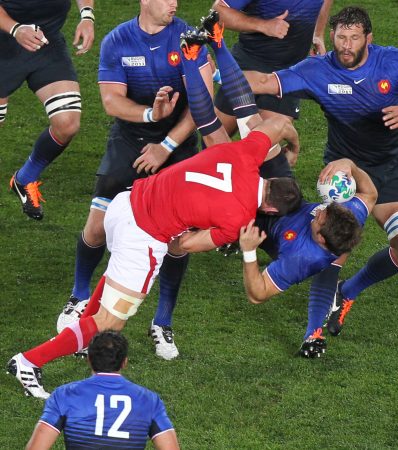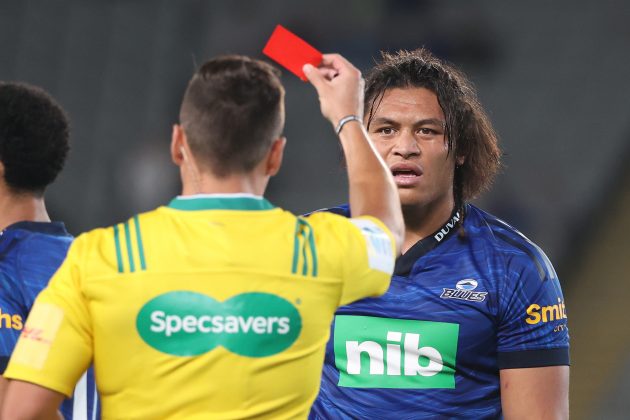Super Rugby is trialling a law whereby a red-carded player can be replaced by a sub 20 minutes later. Should the trial go worldwide? Read our debate from the June 2022 issue
Face-off: Should the 20-minute red card be introduced globally?
CAMPBELL BURNES
YES, says the Editor of Rugby News NZ
Surely it’s a no-brainer, if you’ll pardon the expression?
A 20-minute red card punishes the ‘transgressor’ and yet doesn’t ruin the game as a spectacle. Imagine if Wales had had recourse to a substitute when Sam Warburton was sent off in the 2011 World Cup semi-final? Or if England could have wheeled on their No 19, 20 minutes after the Charlie Ewels incident in this year’s Six Nations?
The other key point is that a 20-minute red card allows for the fact that the referee might have got it wrong. This slavish adherence to player safety is seeing referees dish out red cards for mere accidents where we might see head clashes. Last time I looked, rugby was a fast, dynamic game where occasionally the players will get it wrong in contact.

Rough justice? Sam Warburton’s tackle in the RWC 2011 semi-final saw Wales reduced to 14 men for 61 minutes (AFP/Getty Images)
Red cards should be brandished for malicious acts of foul or dangerous play, not for what Caleb Clarke did against Moana Pasifika where he just got his timing wrong and clattered into Tomasi Alosio’s head. Incredibly, the Blues wing was given a three-week suspension for this accident. But that’s another story…
The real impact of most of the myriad 20-minute red cards dished out in Super Rugby Pacific has been minimal – the Blues still beat Moana Pasifika decisively, for example – but the principle still holds.
The global trial should begin by August and the 20-minute red card should be enshrined in rugby law after the 2023 World Cup.
Let’s show some common sense in a game that is fast losing much of it.
—————————————————————————————————————————————-
CHARLIE MORGAN
NO, says the Senior Rugby Writer at The Telegraph
When was the last time a red card actually ruined a game? When did a dismissal really rid a contest of jeopardy and drama?
You can have Italy’s loss to Ireland during this year’s men’s Six Nations, but that was compromised by the fact that Hame Faiva had already replaced Gianmarco Lucchesi.
By getting sent off – with complete justification – for a high shot on Dan Sheehan, Faiva caused the scrums to become uncontested. Because of a legal loophole, Italy then had to sacrifice an extra player. For all their industry, a 57-6 thrashing ensued.
Many, many other matches have survived, and even thrived, amid red cards. In January, Harlequins dug deep to oust Exeter, who had lost Alec Hepburn on the stroke of half-time. The Premiership final rematch was tight and compelling.

Alec Hepburn’s red card at Quins didn’t stop Exeter contributing to a compelling match (CameraSport)
Charlie Ewels’s plight ratcheted up the Twickenham atmosphere by at least five notches. England lost yet produced their best display of the Six Nations and a remarkable win was possible until Ireland regrouped in the final quarter.
In 2017, Sonny Bill Williams’s red card against the British & Irish Lions represented a fascinating plot twist. New Zealand sacrificed a forward, Jerome Kaino, and brought on Ngani Laumape. The best sides adapt to adversity with tactical tweaks, and the All Blacks so nearly sealed the series.
Besides, a 20-minute red card dilutes the meaningful consequences of actions that can ruin lives due to concussion. That is surely the most significant point.
Face-off: Should the 20-minute red card be introduced globally? We want to know what YOU think. Email your views to rugbyworldletters@futurenet.com

England celebrate winning a scrum penalty v Ireland, when they lost Charlie Ewels after 82 seconds (Getty)
This debate first appeared in the June 2022 issue of Rugby World.





